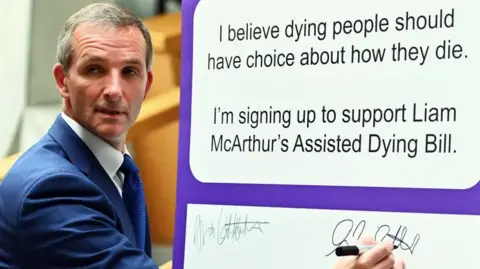Glenn Campbell
BBC Scotland Political Editor

 Getty Images
Getty Images
John Swinney's decision not to support the legislation could sway come undecided MSPs
First Minister John Swinney has said he will not support a bill which would allow assisted dying in Scotland.
Legislation to allow terminally-ill people to take their own life is being put forward at the Scottish Parliament by the Liberal Democrat MSP Liam McArthur and will be voted on by MSPs on 13 May.
If the bill passes it would allow a patient to request medical assistance to end their life, but only if they had a terminal illness and had been ruled mentally fit to make the decision by two doctors.
A Holyrood committee which is scrutinising the legislation has said members should vote at the first stage of the process as a "matter of conscience".
It is thought Swinney's decision to vote against the bill may sway some undecided MSPs, particularly in his own party.
The first minister said his religious faith was a factor and that he had "agonised" over his decision in a way that he did not on two previous assisted dying bills because he considered those to be bad law.
Swinney said he believed that changing the law would alter the relationship between doctor and patient.
It could also put pressure on some vulnerable people to end their lives prematurely, Swinney added, and that if the law was passed it would lead to a campaign to expand the circumstances in which it could be applied.
The stage one vote next week will be the third time in the Scottish Parliament's history that a vote will be held on this issue.
In 2010, the End of Life Assistance (Scotland) Bill failed, followed by an attempt in 2014 with the Assisted Suicide (Scotland) Bill.
The terminology may have changed, but the principle is much the same.
MPs in England and Wales voted in favour of a bill to allow assisted dying last year, by 330 votes to 275.
Like the UK parliament vote, Swinney said the Scottish government would not stand in the way of the legislation and that SNP MSPs would have a free vote.
The first minister said in October last year that he had "not come to a final view" on the issue but added that the initial proposed age threshold of 16 was "a very significant issue" in his mind.
Liam McArthur has since said he would raise the minimum age in the proposed legislation from 16 to 18.
The Lib Dem MSP said he had considered the matter "very carefully" and the change was in line with legislation in the US, Australia and New Zealand.
He has urged MSPs to vote in favour of the bill and help create "the most compassionate, safe and suitable law for Scotland".
The first minister has praised MacArthur's efforts to produce "a more considered proposal" this time.

 Getty Images
Getty Images
MSPs will vote on Liam McArthur's bill on 13 May
The Scottish bill has proved divisive, and is opposed by the Catholic Church in Scotland and the Scottish Association of Mosques.
Politicians including former First Minister Humza Yousaf and Labour MSP Pam Duncan-Glancy have indicated they would vote against it.
The Church of Scotland is "partially opposed" to the legislation becoming law, but says its official position is currently under review.
Ally Thomson, the director of the Dignity in Dying Scotland pressure group, previously said the minimum age change from 18 to 16 made sense and that "compassion, choice and safety" remained at the heart of the bill.
Alisdair Hungerford-Morgan, the CEO of the charity Right To Life UK said despite the age change the legislation "remains riddled with irredeemable flaws and inadequate safeguards", claiming terminal illness is "defined worryingly loosely".
Holyrood's health committee, which is scrutinising the legislation, has highlighted a number of areas it said required further consideration should the bill progress to stage two.
These include the provision and quality of palliative care, how to ensure the mental capacity of patients opting for assistance to die and the possibility of healthcare professionals being able to "opt-in" to the practice.
.png)
 7 months ago
23
7 months ago
23








 English (US) ·
English (US) ·